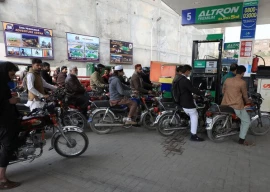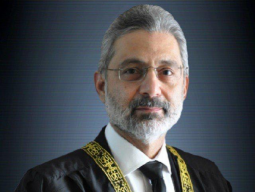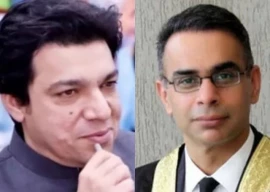
One concept which has become a household name under the present judicial disposition is the suo motu powers of the Supreme Court. Taking a leaf from the Supreme Court, various high courts of Pakistan have also been dispensing justice under the ambit of suo motu jurisdiction.
Suo motu means ‘of one’s own motion’. The expression implies a consideration, discretion and option. The court initiates proceedings ‘suo motu’, i.e., on its own without any party approaching for it. Mostly, the court intervenes so as to check the abuse of power by the executive, often in cases of violation of human rights and public interest.
While the power of the Supreme Court to exercise suo motu powers under Article 184(3) of the Constitution is lucid and vivid, the legal debate which has been going on for the last many years is whether the high courts, under Article 199 of the Constitution, could dispense justice suo motu?
Recently, we have seen that the high courts in suo motu jurisdiction have delivered judgments on multifarious topics; some of the noted ones are where the Lahore High Court declared an appointment of a police officer void and directed him to relinquish charge, took notice of financial scams or the death of an inmate where torture was suspected.
The Lahore High Court under Chief Justice Khawaja Mohammed Sharif took up numerous matters suo motu, but interestingly, Chief Justice Azmat Saeed’s view on the subject was unequivocal and contrary that the high court has no suo motu powers as judged by him in the matter of appointing the vice-chancellor of a university.
The Balochistan High Court, in a recent judgment, examined the issue at great length. In this matter, the bench was assisted as amicus curiae senior advocates Iftikhar Gilani, SM Zafar and Asma Jahangir. Iftikhar Gilani’s view before the bench was that the high court has complete suo motu powers. SM Zafar advised the bench to adopt restraint and drop the proceedings. Asma Jahangir was of the view that the high court cannot take cognisance of any violation of fundamental rights on its own (or suo motu). Surprisingly, the bench decided inter alia that: “Article 199 of the Constitution does not prohibit the high court itself (or suo motu) from taking notice of the violation of fundamental rights. The word application used in Article 199 cannot be limited to mean something written on a piece of paper. There is no reason that a letter addressed to the chief justice of a high court or a note put up before the chief justice that identifies serious transgression of fundamental rights, should not be deemed to be an application as envisaged in the Constitution.”
The Peshawar High Court has also been hands on with regard to suo motu and has decided many cases ranging from flour crises, encroachment of graveyards, cattle and poultry smuggling, fencing and clearing of canals to the quality of chapli kebabs through suo motu proceedings.
A division bench of the Peshawar High Court, on August 28, 2013, took suo motu notice of incidents in which female voters in NA-5 Nowshera and NA-27 Lakki Marwat were denied their right of franchise and held that the result shall neither be announced nor the same be notified in the official gazette.
The said matter went to the Supreme Court through two appeals. The Supreme Court considered all the case law on the subject and has inter alia held that: “It be noted that no judge of a high court or the Supreme Court is robed, crowned or sceptered as a king to do whatever suits his whim and caprice. In all eventualities, he is bound to abide by and adhere to the law and the Constitution. This is what he has undertaken in his oath while being sworn in as a judge or a chief justice of a high court. Yes, in certain cases, a high court on receipt of a letter or an application of an aggrieved person can convert it into a constitutional petition and exercise its constitutional jurisdiction but not in the matters where the Constitution and the law of the land have provided a forum and machinery for their settlement. Any deviation from this course is apt to lead the country to anarchy rather than the rule of law, which cannot be encouraged in any form and colour.” The Supreme Court further held that: “The high court cannot exercise suo motu jurisdiction under Article 199 of the Constitution.”
This landmark and exhaustive judgment of the Supreme Court will now be the guiding light for all high courts of the country and as held in the judgment, no high court can exercise suo motu jurisdiction under the Constitution.
Even otherwise, since a high court does not have the machinery or follow-up tools to ensure that judgments announced under the suo motu jurisdiction are being implemented in letter and spirit, therefore, most of the judgments delivered under the suo motu jurisdiction have just been ‘band-aid’ type of solutions for a limited time and things go back to business as usual within a very short span of time.
Published in The Express Tribune, December 4th, 2013.
Like Opinion & Editorial on Facebook, follow @ETOpEd on Twitter to receive all updates on all our daily pieces.
COMMENTS (3)
Comments are moderated and generally will be posted if they are on-topic and not abusive.
For more information, please see our Comments FAQ























1715843823-0/WhatsApp-Image-2024-05-16-at-12-14-16-(1)1715843823-0-270x192.webp)






Suo motu actions have done more good than harm. It has tried to check rampant corruption and slowed down loot by politicians and their families. Yes, there is criticism that it was over used but so be it. Anything that even remotely slow down corruption in the country, or preserve rights of a common man is welcome. Those who wants to compare themselves to civilezed countries need to open their eyes first and look what is going on in the country. Get civilized first before dreaming of civilized laws.
I would expect from a law scholar to give facts and examples as to where in the world suo motu has been this ruthlessly used? Where in the world has a paid govt institution challenged an elected govt in all its executive appointments and been a hurdle in the functioning of govt? It is a shame that this practice has not even been used by our LHC and SC in the past despite their long black history. In all civilized countries parliament of elected people is supreme and makes and changes laws not the SC and the generals.
buttered up well! now we all love the CJ!